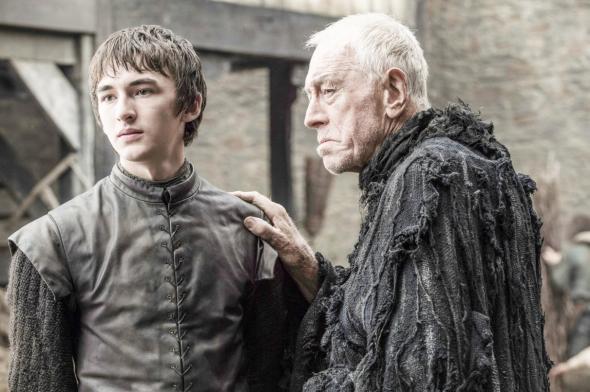The sixth season of Game of Thrones, while still young, is proving to be as awkwardly paced and claustrophobic as the last. Unsurprising and senseless things are happening in cages and dark rooms and on rickety bridges. It’s all rather ho hum, with one exception. The only story with any measure of grace and wonder belongs to a character who was completely absent from Season 5: Brandon Stark.
Surprise! You may need time to come to terms with this development. If, like many, you’re accustomed to groaning every time Bran appears on screen, you may have spent the opening scene of Sunday’s episode, “Home,” sympathizing with Meera, who complains that during his visions “nothing happens.” Indeed, the younger Stark has always been the most maligned, for his dawdling odyssey, beset by indecipherable visions, in search of a bird. There’s also the fact that the little Bran we first got to know aged with alarming (and mockable) speed. But worst of all, the character was insufferably reactive, needing constant pushing and pulling by everyone around him as he vacillated between whining and rolling his eyes back into his head.
All that has changed. Bran’s absence from Season 5, which once seemed like an expediency, now feels like a stroke of genius. A year has allowed Isaac Hempstead Wright’s voice and body to stabilize into reedy mid-adolescence. By letting the “nothing happens” training happen offstage, the show has skipped the slow burn that plagues the other plotlines. (Just how long did it take Jaime and Bronn to reach Dorne last year?) Now, it’s clear, we’re just getting to the good stuff—a narrative efficiency rare to Game of Thrones.
It helps, of course, that Bran, who despite his newfound confidence is still a little annoying, now has the luxury of relying on the ballast provided by his mentor, played by Max Von Sydow. Of all the guest-star wattage that has descended upon the bloody proceedings, perhaps only Diana Rigg has matched Von Sydow, who can regurgitate axioms (“It’s beautiful beneath the sea, but if you stay too long, you’ll drown”) with an insinuating twinkle unparalleled among ex-Bergman muses.
To see him try to restrain Bran’s excitement while they move through a bygone Winterfell is to be reminded that as narrative devices, flashbacks can be arrows to the heart. Who isn’t charmed to see little Ned alive and as instinctively paternal as ever? Even someone like me who knows nothing about the books knows enough to suck in my breath at Lyanna’s name when she rides in on horseback. Bran’s awe at her appearance mirrors our own. She arrives with a train of anticipation and intimated tragedy few other characters could.
Then there’s Hodor. How we missed you, big guy! I’ll leave aside any speculation about what might have turned the stableboy called Wylis into the giant simpleton we now know and love. When the camera turns to him at the end of Bran’s vision, Kristian Nairn’s reflective “Hodor” does more to convey the passage of time than anything else said out loud so far this season.
But the reason Bran’s story is the one I will most look forward to on Sundays is that it is the only thread this season with a dram of mystery left to it. Plenty has been written this week about the poorly handled developments occurring elsewhere in Westeros (Arya spent two beleaguered episodes as a beggar merely to prep for a pop quiz? Did the showrunners really expect the languid pacing of Jon Snow’s resurrection to trick us into being surprised?)—outcomes that have felt cheaply binary. Bran’s, meanwhile, should it continue to plumb the secrets of the past, or turn to the ravaged world at present, feels as wide open as the snowy vantage that closes the scene.
For a show that has become entirely too obsessed with staging reversals and erasures, it’s more than welcome relief to feel curiosity rather than nervous anticipation. It’s been a long time since Game of Thrones has shown interest in anything other than the shallowest expressions of the simplest desires. May Bran’s return not only save the Seven Kingdoms—may it save the show from itself.
